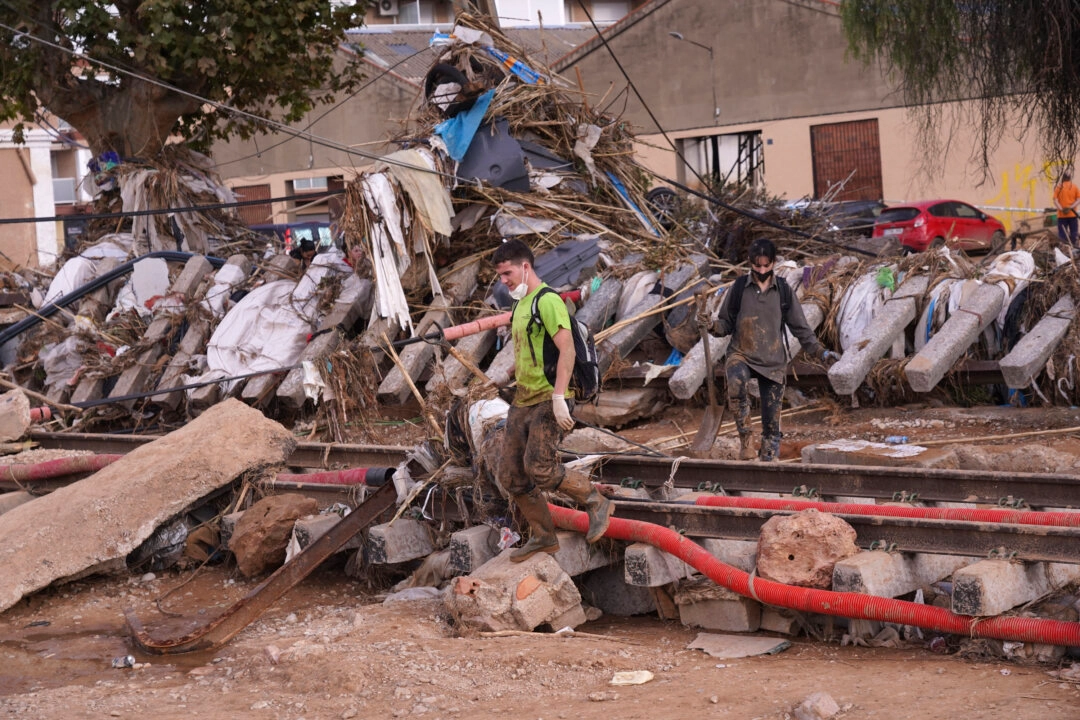Catastrophic Floods by the Numbers: At Least 219 Dead, 93 Missing, and Billions in Damage
MADRID—The catastrophic torrential rains that overflowed rivers and normally dry canals in eastern Spain last week triggered flash floods that submerged entire communities and killed scores of people.
The deluge left behind a landscape of devastation, especially in Valencia, the hardest-hit region. The search for the dead and missing continues, more than a week since the Oct. 29 floods hit—as well as a gargantuan cleanup and recovery effort.
Here’s a look at Spain’s deadliest natural disaster of the century, by the numbers:
At Least 219 Dead and 93 Missing
The historic floods caused 219 deaths, 211 of them in the Valencia region alone. Another seven people died in neighboring Castilla La Mancha and one more in southern Andalusia.
Ninety-three people have been officially declared missing, but authorities admit that the real number could be higher. Another 54 bodies remain unidentified. In total, 36,605 people have been rescued, according to authorities.
Cost of Damage Is in Billions
The full extent of the damage is unknown, but Spain’s Consortium for Insurance Compensation, a public-private entity that pays insurance claims for extreme risks like floods, estimates that it will spend at least 3.5 billion euros ($3.8 billion) in compensation.
The consortium has received 116,000 insurance claims for flood damage, with 60 percent of the claims for cars and 31 percent for homes. Spain’s Association of Insurance Companies anticipates the flooding will break a historic record for payouts.
The Transport Ministry has so far repaired 144 miles of road and rail tracks but the high speed train line between Valencia and Madrid is still demolished.
The central government has approved a 10.6 billion-euro ($11.6-billion) relief package for families, business and townhalls. The Valencia regional government is asking Madrid for 31 billion euros ($33 billion) in aid as well.
Record Rainfall Set Off the Disaster
Spain’s meteorological agency says that 30.4 inches fell in one hour in the Valencian town of Turis, an all-time national record for rainfall set on Oct. 29. The devastated village of Chiva also received more rain in eight hours than the town had experienced in the preceding 20 months.
The storms honed in on the Magro and Turia Rivers and the Poyo canal, turning them into swift currents that swept away everything in their path. To the human eye, it looked as if a tsunami-like wave of water and mud cut a swath through the southern outskirts of the city of Valencia.
The European Space Agency said that, according to satellite images captured on Oct. 31, water covered an area of 38,600 acres. About 190,000 people were directly affected, the agency said.
In all, 78 municipalities had at least one resident perish in the floods.
More than 17,000 Troops and Police, and an Army of Volunteers
The emergency operation mobilized by central authorities has grown to more than 17,000 troops and police officers.
The operation includes 8,000 soldiers—2,100 of them belonging to military emergency units specialized in disaster response—along with 9,200 additional police officers from other parts of Spain.
Thousands of ordinary citizens volunteered, with no definite estimate as to exactly how many, have helped from day one with the cleanup effort.
The government said that in the first week after the floods, authorities restored electricity to 147,000 homes and distributed some 178,000 bottles of water to places that were still without drinking water.
What We Still Don’t Know
Spanish authorities have yet to say how many calls about missing people they received, give an estimate of the property damage, or release a calculation of how much land was devastated.
And at this point, no one can guess when the recovery effort will be concluded.

